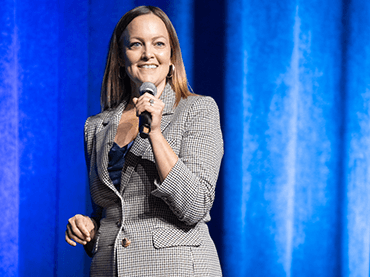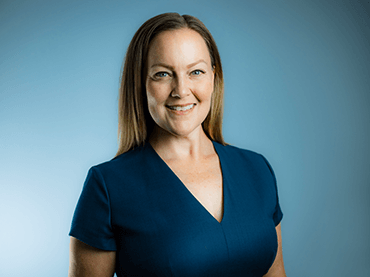Looking back, Meghan Barp recalls her headaches starting around age 12.
“I played sports and I’d get really bad headaches if I ran or exerted myself too much,” she says.
Over the years, she talked to doctors about her chronic headaches, but they simply attributed it to stress or hormones. “I decided to live with it,” says Meghan, now 47, president and CEO of United Way of Greenville County in South Carolina. “Then, my symptoms got worse.”
"I feel like a new person. It truly has changed my life for the better." — Meghan Barp
The Challenge: Worsening Symptoms
After more than three decades of chronic headaches, Meghan started noticing other symptoms. In addition to worsening headaches, she experienced numbness and tingling in her hands and feet and had neck and shoulder pain.
“I do a lot of public speaking,” says Meghan. “I’d get deep radiating headaches, especially if I had to project my voice or anytime my head was below my heart. I couldn’t do yoga or gardening anymore. It was really limiting my life.”
In late 2021, Meghan was vacationing with her husband in Mexico when she suddenly fainted. On her return to Greenville, she insisted her doctor order an MRI and learned she had Chiari malformation — a rare congenital brain abnormality. It causes brain tissue to push through the normal opening where the skull joins the spinal canal, obstructing the flow of cerebrospinal fluid, and putting pressure on the spinal cord.
Schedule an Appointment or Ask a Question
The Path to UPMC
Meghan immediately began researching Chiari malformation. “I wanted to understand more about Chiari and my treatment options,” she says.
The more she read, the more Meghan realized she needed an experienced surgeon. She interviewed several neurosurgeons before her search led her to Robert Friedlander, MD, Walter E. Dandy Distinguished Professor and chair of the University of Pittsburgh Department of Neurological Surgery. Dr. Friedlander is a nationally recognized expert in treating Chiari malformation.
At the time, Meghan wasn’t convinced she wanted to undergo surgery. “I’m a bit of a workaholic and I’m passionate about my job,” says Meghan. “I couldn’t see taking the time off.”
She set up a virtual meeting with Dr. Friedlander who, after reviewing her MRI, said “It’s a mechanical issue that requires a mechanical solution. This will likely dramatically improve your life.”
“From that moment, I knew what I needed to do,” says Meghan. “What he said made a lot of sense.”
The Solution
After discussing her case with Dr. Friedlander, Meghan decided to delay surgery until January 2023 — a slower time of the year for her job.
Although she admits having brain surgery is “a little scary,” Meghan says she wasn’t worried. She knew from her research that Dr. Friedlander is “the best of the best.” She was impressed by his research, experience, use of cutting-edge techniques, and his team at UPMC.
“I felt very confident and comfortable knowing this was the right choice for me and my long-term health,” says Meghan.
In January 2023, Meghan underwent Chiari decompression surgery at UPMC Presbyterian. During the procedure, Dr. Friedlander removed a small section of bone at the back of her skull and placed an expansile patch to provide more space for her brain to restore the normal flow of spinal fluid and eliminate pressure on the spinal cord.
When Meghan moved from the operating room gurney to her hospital bed, she knew the surgery had worked. “I felt immediate relief,” she says.
The Results
 Meghan was discharged from the hospital the next day. She and her husband had planned to stay in Pittsburgh until her follow-up appointment two weeks later. But she felt so good they got permission from Dr. Friedlander to drive home — after promising to stop every two hours to walk around.
Meghan was discharged from the hospital the next day. She and her husband had planned to stay in Pittsburgh until her follow-up appointment two weeks later. But she felt so good they got permission from Dr. Friedlander to drive home — after promising to stop every two hours to walk around.
Two weeks later, she boarded a plane back to Pittsburgh. “I was nervous about flying back for my follow-up because I always got insane headaches from the pressure. But this time, I flew without getting a headache,” she says.
Meghan describes the surgery as “life-changing.” She’s headache-free for the first time in decades and has no numbness, tingling, or pain. In addition to working full time, she’s “enjoying life” — taking golf lessons, playing tennis, and gardening on a regular basis.
“I feel like a new person. It truly has changed my life for the better,” says Meghan. “Choosing Dr. Friedlander was absolutely the best decision I could have made.”
Our patient stories profile a number of patients who have had minimally invasive brain surgery at UPMC. Although everyone's care experience is unique, we hope that sharing these stories will help other prospective patients and their families better understand these procedures and their potential benefits.
Meghan’s treatment and results may not be representative of all similar cases.

















